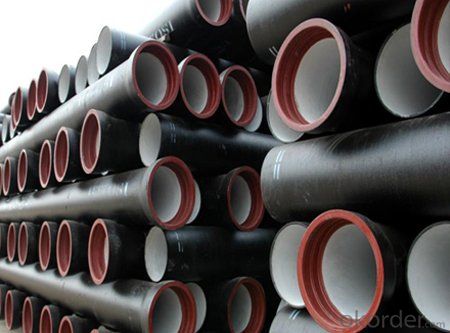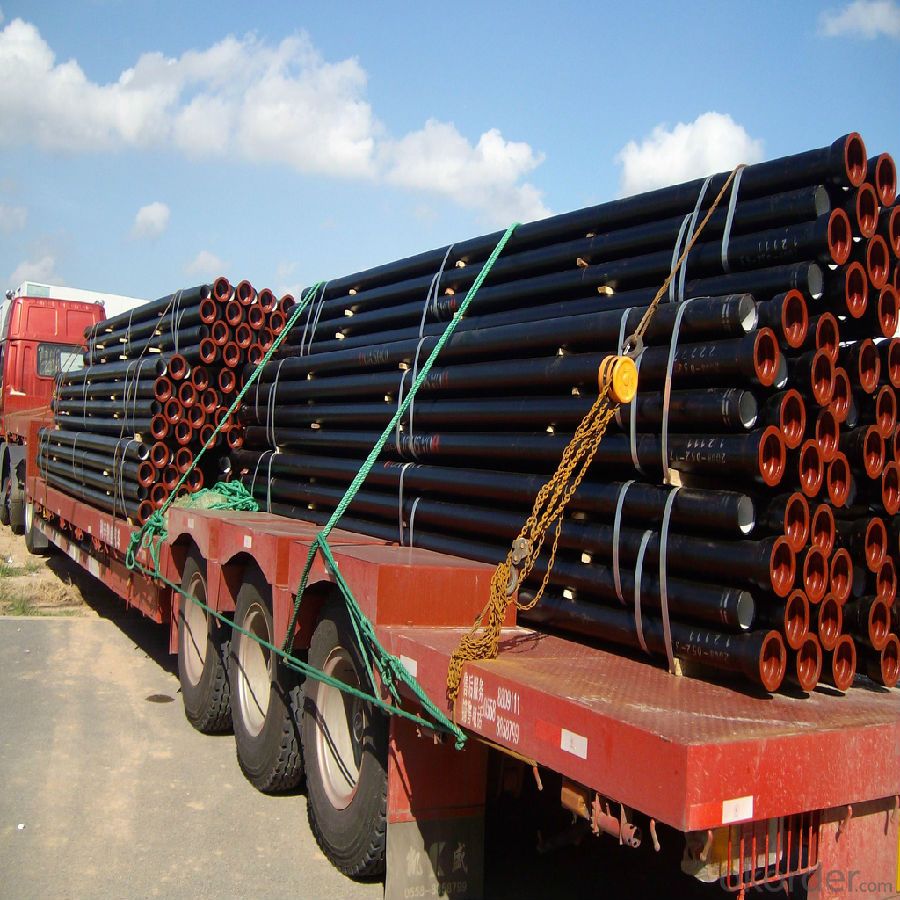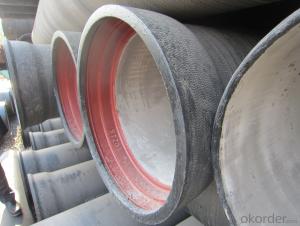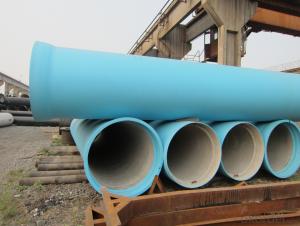Ductile Iron Pipe of China EN545/EN598/ISO2531 DN500
- Loading Port:
- China main port
- Payment Terms:
- TT or LC
- Min Order Qty:
- 25 m.t.
- Supply Capability:
- 200000 m.t./month
OKorder Service Pledge
OKorder Financial Service
You Might Also Like
1,Ductile Iron Pipe Description :
1) Pipes confirm to ISO2531,K9 class,T type joint,6m long,with inside cements lining conform to ISO4179, outside Zinc spraying(130g/m2) and bitumen coating(70μm) conform to ISO8179.
2) Pipe ends: Spigot and socket ends, with 100% SBR rubber gaskets accoding to ISO4633
3) we can do third party inspection according to customer's request.
4) Our products have been sold to many international market, such as Middle East and South East Asia and Africa.
2,Main Features of the Ductile Iron Pipe:
•High yield strength
•High tensile Strength
•High corrosion resistance
•Pressure Resistence
•Anti-corrosion
•Installation is convenient
•Satisfy the highest hygienic standards
3,Ductile Iron Pipe Images:


4. Ductile Iron Pipe Specification
Surface Finishes: Bare, Oiled, Mill Varnish, Galv,FBE, FBE Dual, 3LPE, 3LPP, Coal Tar,Concrete Coating and Tape Wrap
End Finishes: Beveled, Square Cut, Threaded, hat
Additional Services: Internal Coating
Packaging: packed in bag, plastic bag, steel strip, steel wire,double wire, iron box, wooden box, tarpaulin, plastic sheeting
Inspection: MOODY SGS BV GL DNV ABS LIOYD’S
Test: X-ray, UT, magnetic particle,inspection,hydrostatic test.
Processing service: Beveling, Threading, Slotting, Cut-to length, Bends, Quench and Temper, Fabrication, Double-jointing and On-site assistance
Documentary: MTC, material certification,Origin certification, CI or PI,Test Report, export licence, handling order, B/L,insurance policy,shipping instructions, contract, packing list etc.
Internal lining: ductile iron pipes shall have an internal cement mortar lining in acc with ISO4179.
External coating: ductile iron pipes shall be externally coated with metallic zinc spray plus a further layer of resin painting to ISO8179.
Gasket: 100% SBR/NBR/EPDM rubber gasket in accordance with ISO4633.
Payment term: L/C, T/T.
5.FAQ:
We have organized several common questions for our clients,may help you sincerely:
1.Q: Why would you choose ductile iron pipe rather than other pipe materials?
A:The reasons are obvious for that not only ductile iron pipe possesses the inherent strength and flexibility of ductile iron, combined with proven corrosion protection systems, but also the cost savings can be achieved from design to installation and commissioning.
2.Q:Why can you guarantee the inner of pipes can’t be corroded?
A: High alumina cement mortar lining and sulphate-resistant cement mortar lining. These two special linings are applicable to inner anti-corrosion for sewage pipes, improving resistance to erosion of the sewage components.
- Q:Can ductile iron pipe be used for water well applications?
- Yes, ductile iron pipe can be used for water well applications. Ductile iron has excellent strength, durability, and corrosion resistance, making it suitable for transporting water in various applications, including water well systems.
- Q:What is the difference between spheroidal graphite cast iron QT400-15 and QT400-15A? What does the A mean later?
- This should be said in front of the material, and later add A, should refer to the grade
- Q:What is the difference between ductile iron and cast iron pipes?
- The main difference between ductile iron and cast iron pipes lies in their composition and properties. Ductile iron pipes are made from an alloy of iron, carbon, and silicon, which makes them more flexible and resistant to cracking. On the other hand, cast iron pipes are made from a mixture of iron, carbon, and other elements, which provides them with a higher resistance to corrosion and pressure. In summary, ductile iron pipes are more flexible and durable, while cast iron pipes are more resistant to corrosion and pressure.
- Q:How is ductile iron pipe protected against external corrosion?
- To ensure the durability and longevity of ductile iron pipe, various methods are employed to protect it from external corrosion. One commonly used method is the application of protective coatings. Typically, a layer of zinc or asphaltic material is applied to the pipe, creating a barrier between the iron and the surrounding environment. This coating prevents direct contact between the pipe and corrosive elements like soil, moisture, and chemicals, thereby reducing the risk of corrosion. Another layer of protection is provided by wrapping the ductile iron pipe with polyethylene or polypropylene tape. This tape acts as a physical barrier, shielding the pipe from moisture and other potentially corrosive substances. Great care is taken during the application process to ensure complete coverage and adherence to the pipe's surface. Cathodic protection is also commonly used to safeguard ductile iron pipes from external corrosion. This technique involves installing sacrificial anodes or impressed current systems near the pipe. These anodes generate a protective electrical current that counteracts the corrosion process, effectively inhibiting the deterioration of the pipe's surface. Proper installation practices also play a crucial role in preventing external corrosion. It is important to bury the pipe at an appropriate depth, ensuring adequate soil coverage. This minimizes exposure to corrosive elements and maintains the integrity of the protective coatings. Additionally, using corrosion-resistant bedding materials and employing proper backfilling techniques can further enhance the pipe's resistance to external corrosion. In conclusion, a combination of protective coatings, tape wrapping, cathodic protection systems, and proper installation practices ensures the protection of ductile iron pipe against external corrosion. These measures work together to provide a strong defense against corrosive forces, ensuring the pipe's reliability and longevity in various applications.
- Q:Can ductile iron pipe be used for municipal water supply?
- Yes, ductile iron pipe can be used for municipal water supply. Ductile iron pipe has been widely used in municipal water supply systems for many years due to its durability, strength, and resistance to corrosion. It is well-suited for underground applications as it can withstand high pressure and heavy loads. Additionally, ductile iron pipe has a long lifespan, typically exceeding 100 years, which makes it a cost-effective choice for municipal water supply systems. Overall, ductile iron pipe is a reliable and commonly used material for ensuring the safe and efficient delivery of water to communities.
- Q:What is the expected buoyancy of ductile iron pipes?
- The expected buoyancy of ductile iron pipes can vary depending on several factors such as the diameter, wall thickness, and the specific gravity of the fluid being transported. However, in general, ductile iron pipes are known for their relatively low buoyancy compared to other materials like plastic or concrete. Due to their higher density and weight, ductile iron pipes tend to have a greater resistance to buoyancy forces. This makes them suitable for applications where buoyancy is a concern, such as water and wastewater transmission systems. The combination of their inherent strength and weight helps to keep the pipes grounded and prevents them from floating or rising to the surface. It is important to note that even though ductile iron pipes have lower buoyancy compared to other materials, they may still experience some level of buoyancy in certain scenarios, especially when the fluid being transported has a lower specific gravity. To mitigate this potential issue, additional measures such as anchoring or ballasting may be employed to ensure the stability and integrity of the pipeline system. Overall, while the expected buoyancy of ductile iron pipes is generally low, it is crucial to consider the specific conditions and requirements of the project to determine the most appropriate pipe material and design for optimal performance and safety.
- Q:Can ductile iron pipes be used for underground hydropower systems?
- Indeed, underground hydropower systems can utilize ductile iron pipes. Renowned for their robustness and endurance, ductile iron pipes are apt for a wide range of purposes, including subterranean installations. With remarkable resistance against corrosion and the ability to withstand intense pressure, they are exceptionally suited for transporting water in hydropower systems. Furthermore, ductile iron pipes boast a lengthy lifespan, diminishing the necessity for frequent replacements and reducing maintenance expenses. Moreover, they exhibit excellent joint integrity, guaranteeing leak-free connections beneath the surface. Thus, ductile iron pipes emerge as a dependable option for underground hydropower systems.
- Q:Can ductile iron pipe be used for gas distribution systems?
- Yes, ductile iron pipe can be used for gas distribution systems. Ductile iron pipes have proven to be reliable and durable, making them suitable for carrying natural gas and other gases in distribution systems. They have good corrosion resistance, high strength, and can withstand high pressure, making them a commonly used material in gas distribution infrastructure.
- Q:Can ductile iron pipes be used for underground drainage systems?
- Indeed, underground drainage systems can utilize ductile iron pipes. Ductile iron, being a robust and enduring substance, exhibits resistance to corrosion, rendering it appropriate for subterranean applications. Possessing remarkable tensile strength, it can endure substantial loads and pressures, thereby making it an excellent choice for drainage systems that encounter significant flow rates or necessitate substantial burial depths. Moreover, ductile iron pipes boast an extended lifespan, thereby decreasing the requirement for frequent maintenance or replacement. All in all, ductile iron pipes prove to be an unwavering and efficient option for underground drainage systems.
- Q:How does ductile iron pipe perform in corrosive environments?
- The exceptional performance of ductile iron pipe in corrosive environments is widely recognized. Its resistance to corrosion has been thoroughly demonstrated, thanks to its distinctive composition and protective coatings. The presence of graphite nodules is the primary factor contributing to this resistance. These nodules serve as a barrier against corrosive agents, effectively inhibiting the spread of corrosion and providing a protective layer for the iron pipe. Furthermore, ductile iron pipes often undergo various external coatings and linings to further enhance their corrosion resistance. Coatings such as cement mortar lining or epoxy coatings are applied to create an additional protective layer. These coatings act as a barrier between the pipe and the surrounding environment, preventing corrosive substances from reaching the iron surface. In addition, ductile iron pipes are highly durable, which greatly enhances their performance in corrosive environments. They have a long life expectancy and can withstand high-pressure conditions, making them suitable for a wide range of applications. The inherent strength of ductile iron makes it less susceptible to damage, even in harsh environments. It is important to note that while ductile iron pipes exhibit excellent resistance to corrosion, the specific performance may vary depending on the nature and concentration of the corrosive substances present. In extremely aggressive environments, additional protective measures such as cathodic protection or sacrificial anodes may be necessary to ensure long-term durability. Overall, ductile iron pipe has a proven record of outstanding performance in corrosive environments. Its unique composition, combined with external coatings and linings, make it a dependable choice for applications where corrosion resistance is crucial.
1. Manufacturer Overview |
|
|---|---|
| Location | |
| Year Established | |
| Annual Output Value | |
| Main Markets | |
| Company Certifications | |
2. Manufacturer Certificates |
|
|---|---|
| a) Certification Name | |
| Range | |
| Reference | |
| Validity Period | |
3. Manufacturer Capability |
|
|---|---|
| a)Trade Capacity | |
| Nearest Port | |
| Export Percentage | |
| No.of Employees in Trade Department | |
| Language Spoken: | |
| b)Factory Information | |
| Factory Size: | |
| No. of Production Lines | |
| Contract Manufacturing | |
| Product Price Range | |
Send your message to us
Ductile Iron Pipe of China EN545/EN598/ISO2531 DN500
- Loading Port:
- China main port
- Payment Terms:
- TT or LC
- Min Order Qty:
- 25 m.t.
- Supply Capability:
- 200000 m.t./month
OKorder Service Pledge
OKorder Financial Service
Similar products
New products
Hot products
Related keywords



























